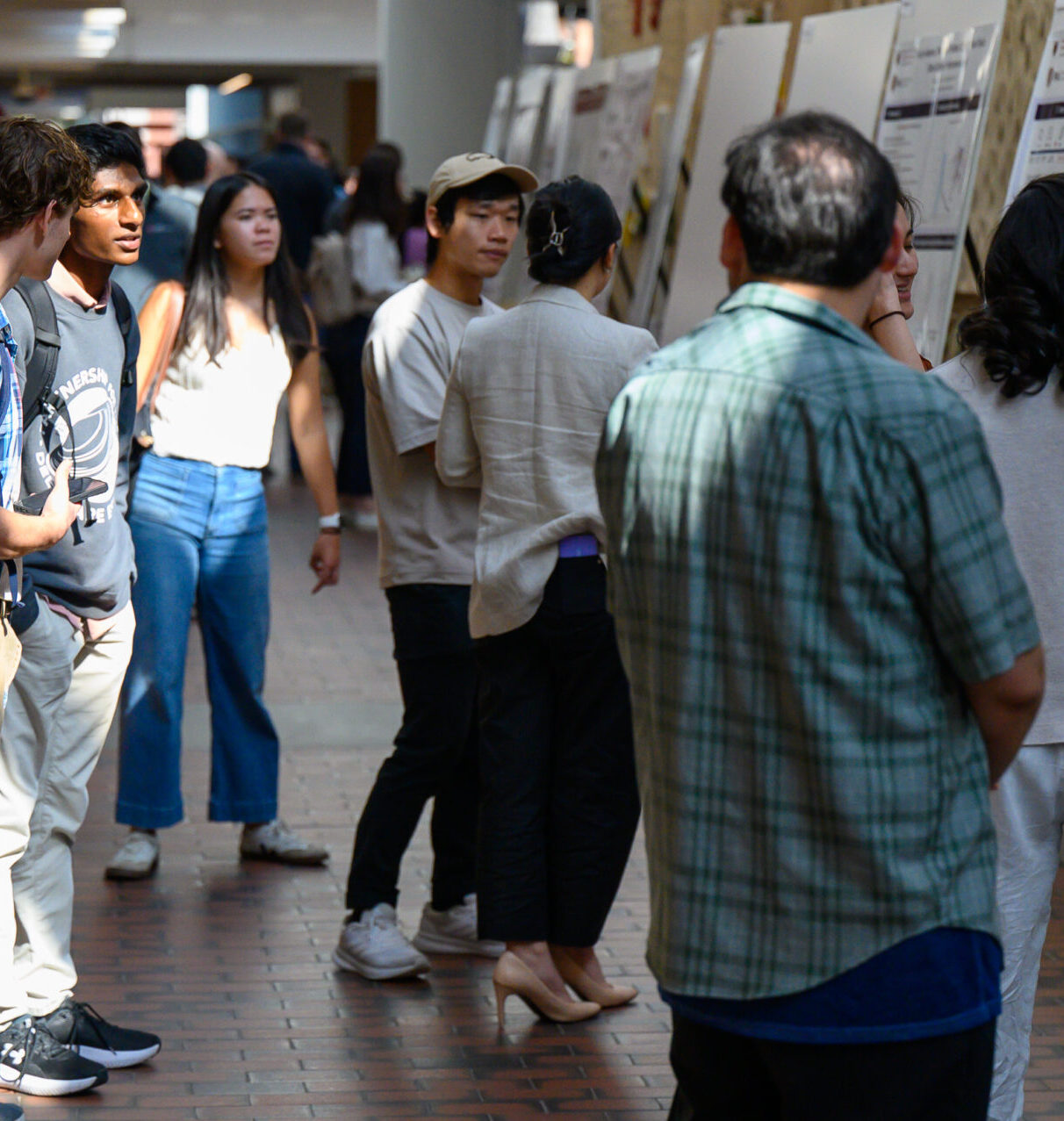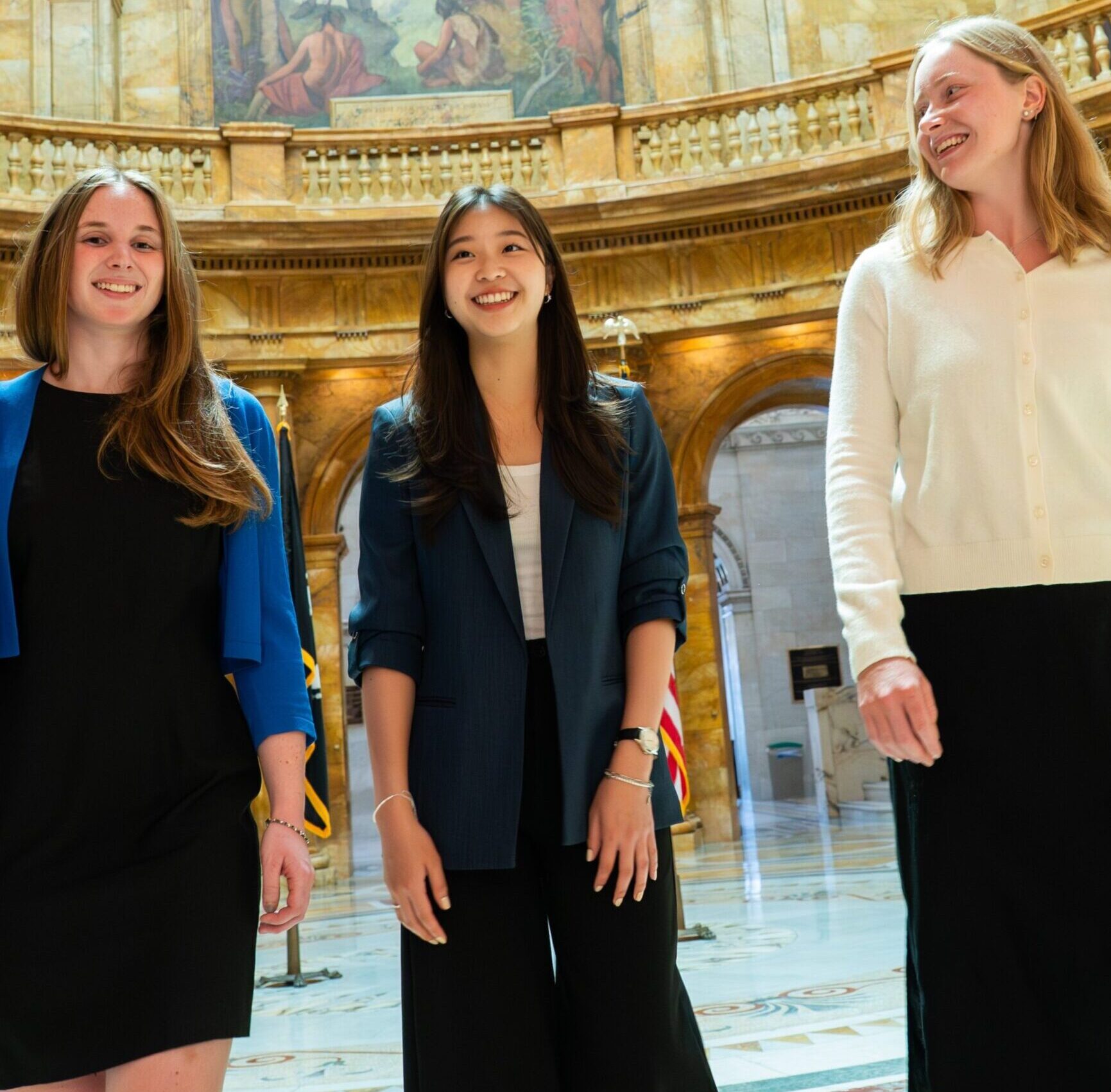Track 1 Research Assistantship Positions
2024 Research Assistant Positions – Salata/HUCE Summer Undergraduate Research Funding Program
The following research assistant (RA) positions are available for undergraduate students during Summer 2023. Interested students should review the program qualifications and application instructions on the Summer Research Funding Program webpage.
- Climateverse, Satchit Balsari and Caroline Buckee | See More
- Climate Health and the Immune System: A Hot Topic, Kari Nadeau | See More
- Environmental Economics and Policy, Robert Stavins | See More
- History of the Health Effects of Climate Change, David Jones | See More
- MethaneSAT/MethaneAIR Image Analysis and Methane Emission Determination, Steven Wofsy | See More
- Modeling of Atmospheric Chemistry, Daniel Jacob | See More
- Optimizing Environmentally Responsible Health Care, Ann-Christine Duhaime | See More
- Plant Responses to Soil and Atmospheric Drought, Missy Holbrook | See More
- Political Economy of Energy Transitions and Adaptation, Dustin Tingley | See More
- Responding to extreme weather events: towards a real-time data pipeline to map displacement during disasters, Caroline Buckee | See More
- Stories of Ecological Devastation, Mental Illness, and Inequality, Karen Thornber | See More
- Strengthening Communities for Changing Energy Systems, Diane Davis | See More
RA Opportunity Descriptions
Climateverse
Faculty Supervisor: Satchit Balsari and Caroline Buckee
School: FAS, HMS, HSPH
Department/Area: Climate and Data
Details: Climateverse offers processed, organized, and easy-to-use data for researchers and policymakers to simplify the data discovery process, making it more relevant and guiding users on its proper utilization. There is an opening on the Climateverse team for a student interested in working this summer at the intersection of climate change and data science.
The Climate Data Steward (Dataverse Specialist) will help manage and refine the Climateverse’s data repository. This role will ensure that datasets from diverse sources become accessible and well-organized within our platform, serving as key instruments for climate research and policy-making. Key responsibilities include:
- Data Integration: Skillfully navigate a wide array of datasets from India and Colombia. Your task involves integration of these datasets into the Dataverse, ensuring they are structured and ready for user access.
- Dataverse Proficiency: You will be responsible for customizing metadata fields and overseeing the smooth uploading of datasets, playing a crucial role in enhancing the platform’s user experience and operational efficiency.
- Protocol Development & Implementation: Develop and implement rigorous protocols for dataset management within the Dataverse. Create detailed documentation and guidelines to ensure a consistent and high-quality approach to data handling.
- Dataset Upload and Organization: Take charge of uploading datasets to the Dataverse by organizing raw datasets into structured formats as necessary. Work with other members of the Climateverse team to develop an automated upload process using the Dataverse APIs.
Contact lmsaiclimate@gmail.com with questions.
Climate Health and the Immune System: A Hot Topic
Faculty Supervisor: Kari Nadeau
School: HSPH
Department/Area: Environmental Health Sciences
Details: Are you interested in conducting research to address the largest health crisis of the century? Climate change is a global health crisis. Undergraduate students with a strong background in biology, climate science, public health or populational health are invited to join us for completing a research project during the summer. Students will learn about and participate in immunology-based research associated with climate change, such as the impact of air pollution or wildfire smoke exposure on the immune system. Possible projects range from cutting-edge wet lab work (e.g., lung organoid exposure studies, studying immune cell dysfunction using cytof, analysis of immune epigenetics, single cell analysis) to dry-lab data science research.
Contact knadeau@hsph.harvard.edu with questions.
Environmental Economics and Policy
Faculty Supervisor: Robert Stavins
School: HKS
Department/Area: Energy and Economic Development
Details: For this summer of research, the student proposes a topic, which applies economic thinking and economic analysis to a policy problem in the realm of environmental, energy, and natural resources. Working with Professor Robert Stavins (Harvard Kennedy School), the student researcher will refine the topic to one that is interesting, feasible, and falls within the scope of environmental economics. Next the student researcher will develop—with guidance from Professor Stavins—an outline of the paper the student will eventually write, and then a work plan of steps to be taken from the beginning to the end of the project, including the key sources of information. After that, the student researcher will meet approximately once per week with Professor Stavins in Zoom sessions until the paper is completed. The best applicants will have studied basic environmental economics, such as in Economics 1661, but that is not a prerequisite.
Contact robert_stavins@hks.harvard.edu with questions.
History of the Health Effects of Climate Change
Faculty Supervisor: David Jones
School: FAS, HMS
Department/Area: History of Science, Global Health and Social Medicine
Details: Professor Jones is engaged in several historical research projects about our evolving knowledge of the health effects of the climate crisis, including one about the history of heatwave mortality, and one about wildfires. Research for each of these projects would be based in Cambridge and involve finding relevant sources (mostly through online resources, sometimes through library collections) and summarizing/analyzing them (e.g., one mission might be to identify, research, and tell the story of 19th century heat waves in Boston and NYC). Scheduling, both of the work itself and of mentoring meetings, is flexible. Please contact Professor Jones if you’d like to discuss these opportunities.
Contact dsjones@harvard.edu with questions.
MethaneSAT/MethaneAIR Image Analysis and Methane Emission Determination
Faculty Supervisor: Steven C. Wofsy
School: SEAS, FAS
Department/Area: Atmospheric and Environmental Chemistry
Details: The student intern will work on the analysis of remote sensing data from our MethaneAIR imaging spectrometer, helping to determine the rates and spatial distributions of methane emissions that give rise to the observed patterns of methane concentrations. The research will involve geospatial analysis and inverse modeling, and the student intern will apply these methods to large data sets in a physics-constrained statistical and/or machine learning framework.
Contact wofsy@g.harvard.edu with questions.
Modeling of Atmospheric Chemistry
Faculty Supervisor: Daniel Jacob
School: SEAS
Department/Area: Atmospheric Chemistry Modeling Group
Details: The Atmospheric Chemistry Modeling Group welcomes applications from Harvard undergraduates interested in computational/statistical research related to greenhouse gases and air quality issues. Undergraduate research assistants will work closely with a student, postdoc, or senior programmer in the group. Some experience and a strong interest in scientific programming are required. Visit the group’s website.
Contact djacob@fas.harvard.edu with questions.
Optimizing Environmentally Responsible Health Care
Faculty Supervisor: Ann-Christine Duhaime and colleagues at the Massachusetts General Hospital Center for the Environment and Health (CEH)
School: HMS
Department/Area: MGH Center for the Environment and Health/Healthcare
Details: Physician and Epidemiology researchers at Massachusetts General Hospital are looking for Harvard undergraduate research assistants to work on a variety of projects relevant to environmental considerations in the health care setting. Students may be considered from a range of concentrations and interests depending on the specific focus of the project. Past research assistants have focused on health facility energy modeling, optimizing “green space” design in an urban hospital, reusable cloth surgical/procedural masks, interactive maps of U.S. hospital demographic and environmental profiles, and design of a portable in-room enclosed “ecosphere” that allows patients to view plants that could be grown for food right in their rooms but not expose them to mold or pollen. Work is planned for hybrid on-site and remote work, include at least twice weekly virtual or in-person meetings. Research assistants are expected to produce a written summary of research findings and/or a publication.
Several research areas are available, as follows, with specific project(s) to be chosen by mutual input from faculty and research assistants:
- Participating in wide-ranging efforts to improve Mass General’s environmental profile with a number of possible projects in energy, waste, toxicity, air quality, building design, supply chain, biomedical research sustainability, public and community health effects, outreach, and communications.
- Working on an ongoing research project assessing interventions to improve sustainability in biomedical research, and whether this affects researchers’ job satisfaction and pro-environmental behavior outside of work.
- Helping to refine metrics of sustainability within the healthcare sector and working on a public-facing dashboard.
- Working on a current research project investigating the effect of a gas-powered intermittent “peak energy” plant in Peabody on the health of local residents.
- Collecting data on hospital operations changes already completed or ongoing in order to write manuscripts for submission for publication about health sector initiatives in sustainability. In particular, we plan to compile data and publish a case study on the process of “moving the needle” towards a more sustainable design for a large new clinical building currently under construction, and how collaboration between engineers, architects, energy experts, clinicians, and community advocates affected the decision-making and ultimate design choices.
- Collaborative design element research relevant to a “green children’s hospital” including the potential focus areas noted above and others relevant to pediatric healthcare, including specific considerations for children’s health and psychological well-being, outdoor and indoor green space, noise reduction, and other elements specifically relevant to pediatric practice.
- Researching (and publishing) the successes and failures of past experiences with repurposing metered dose inhaler (MDI) gases (for example, those used for asthma).
- Creating Center for the Environment and Health education pieces geared towards both patients and staff to host on our website and/or social media. This may include creating and translating artistic, accurate, impactful information into infographics for low literacy or non-English-speaking learners.
- Compiling the current state of environmental sustainability efforts at academic medical centers in the United States, including their staffing and reporting practices. This may result in publication and presentation of results.
- Reviewing hospital clinical policies for potential environmental sustainability issues, with the opportunity to propose potential revisions and document the process for publication.
- Designing and testing a surgical and procedural mask that is fabric-based, washable, modular for different purposes, is effective in the setting of viral pandemics, and could serve as a more permanent solution to worldwide shortages while meeting regulatory requirements and being cost-effective. For this project, experience or interest in life cycle analysis, materials engineering, design, market surveys, business, and health and occupational regulations would be useful.
- Additional projects involving climate change and mental health, advocacy, and other areas of the intersection of environment and health are possible.
Contact aduhaime@mgh.harvard.edu with questions.
Plant Responses to Soil and Atmospheric Drought
Faculty Supervisor: Missy Holbrook
Postdoctoral Supervisor: Cade Kane
School: FAS
Department/Area: Organismic and Evolutionary Biology/Biology
Details: How will plants respond to climate change? To understand the sensitivity of ecosystems to climate change, we need to know how plants respond to changes in temperature, humidity, and soil moisture. This project centers on lab-based research on factors controlling stomatal dynamics. We will use new methods to measure the pressure within stomatal guard cells and relate the regulation of these pressures to stressors such as temperature and humidity. We will also conduct a pilot study on red oak trees at Harvard Forest in which we examine soil water access and internal (xylem) transport capacity – comparing trees whose growth has slowed in recent years versus trees with sustained carbon accumulation. This work is part of a larger study that seeks to predict factors controlling carbon sequestration in eastern forests. Daily lab work will be required, and the research team will help with outlining a potential thesis and/or paper once the lab work has been completed. This is a great project for students interested in lab and field-based physiological techniques and in learning about plant/climate interactions.
Contact holbrook@g.harvard.edu with questions.
Political Economy of Energy Transitions and Adaptation
Faculty Supervisor: Dustin Tingley
School: FAS
Department/Area: Government
Details: This research project focuses on the political economy of a transition from a fossil fuel-based economy into one that has more and more non-fossil fuel-based energy sources. This transition will have a huge range of consequences, including for local and state governments here in the United States but also for communities in other countries. At the same time, the physical Impacts of climate change will impact the ability of governments to respond to a variety of challenges. We will document these challenges, understand how different policies are impacting this transition (or not), and better understand the range of political and financial obstacles. Students will collect data on a range of things, including taxes generated by renewable energy, and expenses local communities bear due to energy and climate transitions, analyze survey data, and review media and other reporting on these topics.
Contact dtingley@g.harvard.edu with questions.
Responding to extreme weather events: towards a real-time data pipeline to map displacement during disasters.
Faculty Supervisor: Caroline Buckee
School: HSPH
Department/Area: Epidemiology, Global Health
Details: Responding to extreme weather events – hurricanes, floods, wildfires, etc. – is something we will need to do with increasing frequency under climate change. Currently, humanitarian agencies and governments who respond use outdated data systems. One of the most important pieces of information that they need for rapidly addressing shelter and health needs of affected populations are where people are; if they evacuated, where did they go? What are their health needs, and can we anticipate which hospitals and clinics they might show up in? How long do people stay away from their homes for, and does this depend on the type of disaster? None of these questions have been answered. Now, however, new data streams from mobile phones, from credit card companies, and power companies, exist that can give insight to support better, evidence-driven disaster response in the context of extreme weather events. We are looking for someone who is quantitative and comfortable coding and analyzing large data sets to help with a project using data from Meta and Safegraph (mobile phone data) to analyze displacement patterns from multiple extreme weather events. The goal of the project is to catalogue and understand how predictable mobility patterns are in this context, so that we can improve our support for humanitarian response agencies that we work with at Crisis Ready (crisisready.io), a Harvard/Direct Relief platform. The student will work with our academic partners at BU and Stanford, as well as our Crisis Ready team, as needed.
Contact cbuckee@hsph.harvard.edu with questions.
Stories of Ecological Devastation, Mental Illness, and Inequality
Faculty Supervisor: Karen Thornber
School: FAS
Department/Area: Comparative Literature/East Asian Languages and Civilizations
Details: Professor Thornber’s new book—Stories of Ecological Devastation, Mental Illness, and Inequality, under contract with Bloomsbury Academic—examines interconnections among environmental degradation, mental illness, and inequality as these are experienced and imagined globally. This book also investigates understandings of mental health vis-à-vis non-human entities (i.e., it aims to decenter mental health as a solely human phenomenon, particularly as relates to changed environments due to climate change and other environmental disrupters). For summer 2024, Professor Thornber is looking for an undergraduate RA to research a range of narratives, including sources from the sciences on animal and plant consciousness/cognition, from the sciences and history of science on the impacts of pollution and other environmental disrupters on depression and other mental health conditions, sources on climate anxiety and similar phenomena (and the different impacts on different communities), as well as film, fiction, social media, journalism, oral histories, etc. that grapple with these topics. Students with an interest in environment (broadly configured), justice (gender, racial, economic, species), and/or mental health are encouraged to apply. Knowledge of a non-English language is welcome, but not required. Students from all concentrations are welcome!
Contact thornber@fas.harvard.edu with questions.
Strengthening Communities for Changing Energy Systems
Faculty Supervisor: Diane Davis
School: GSD
Department/Area: Urban Planning and Design
Details: We seek a student willing to undertake primary and secondary research as well as demographic analysis on the disruptive impacts of the energy transition on communities in the Gulf Coast, the Appalachian region, Texas, and parts of the US west, including California. The student will contribute to the efforts of a larger research cluster team of faculty from the Law School, FAS, and the Graduate School of Design. A principal aim for this summer research is to analyze the social, political, economic, and legal context in which communities and individuals most hurt by the move away from fossil fuels can find alternative means to forge prosperity instead of decline. A longer description of the aims of the Research Cluster is below. An important aspect of this research is the focus on alternative territorial scales for community-building, and the possibility that regions rather than cities (or nations) will be best positioned for achieving equity and justice outcomes during the energy transition. The RA will a) document the nature of changes in cities and regions with quantitative and qualitative materials; and b) help develop a base of historical and contemporary examples of community engagement, regional planning strategies, urban and regional financing mechanisms, infrastructural innovations, and other measures that have helped individuals, communities, towns, and regions weather important market transformation, whether related to the energy market or other major economic transformations. We are particularly interested in underserved localities where lives and livelihoods are made even more precarious by the closing of mines, the relocation of automobile plants, and other changes impacting individuals previously employed in the energy industry. Other key themes explored in the larger project include urban-rural linkages, circular green economy processes, alternative housing or land tenure systems, and the relations between economic decline and urban decline. The Research Cluster on Strengthening Communities for Changing Energy Systems will examine the social costs and benefits of changes in the energy system, and propose concrete ways communities, firms, and governments to help them navigate the wide range of fiscal, legal, regulatory, and development choices they face. This Cluster will also engage directly with decision-makers and stakeholders to advance and support equitable and efficient policies. Building on this direct engagement, the Cluster aims to understand the social effects of energy transitions on communities and regions, the politics of energy transitions, and potential strategies for convening and coalition-building in energy communities. Such knowledge will foster the development of new and pragmatic policy playbooks for effective, equitable and community-driven energy development, and new community capacity for participating in developing energy policy in energy-rich regions.
Contact ddavis@gsd.harvard.edu with questions.











